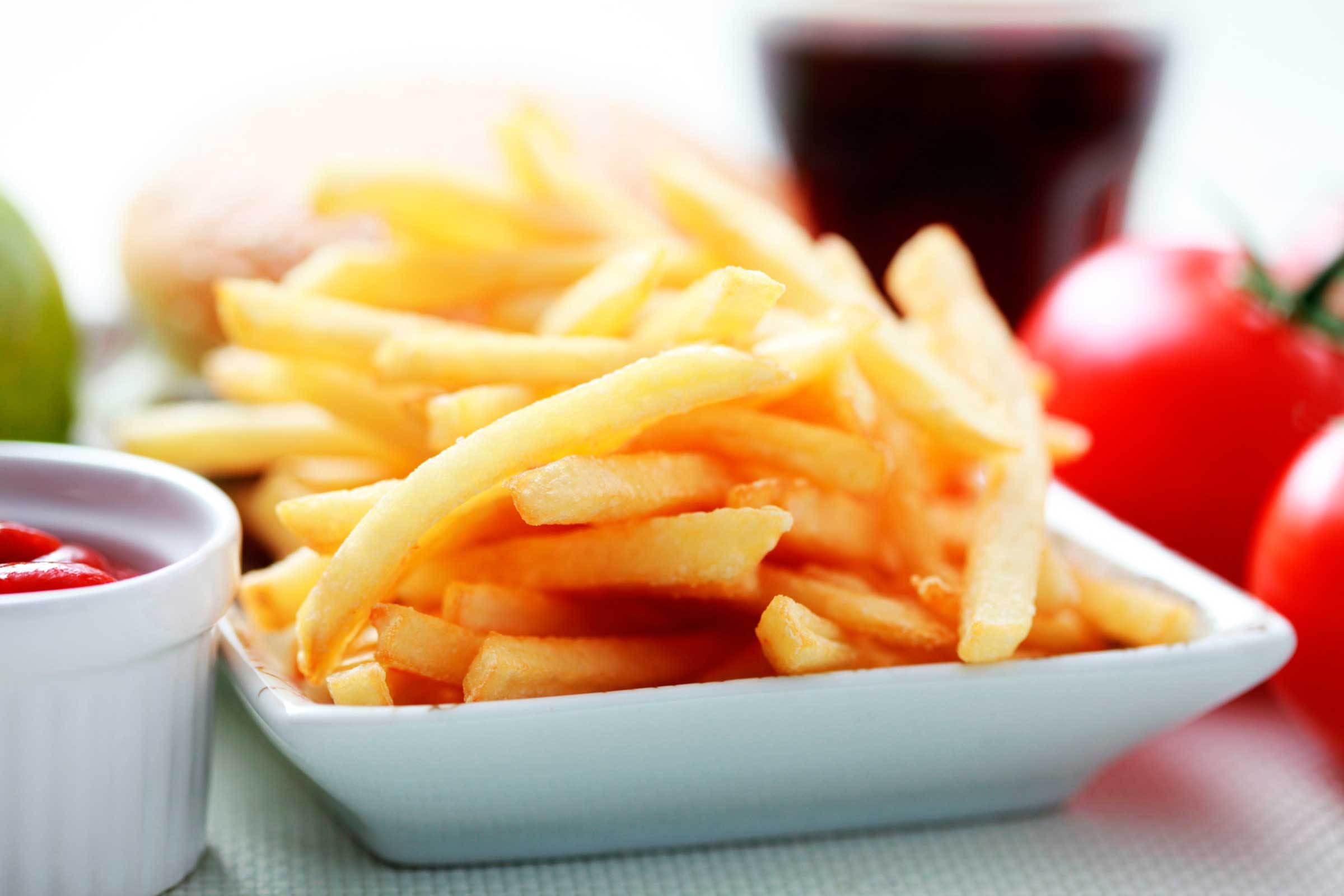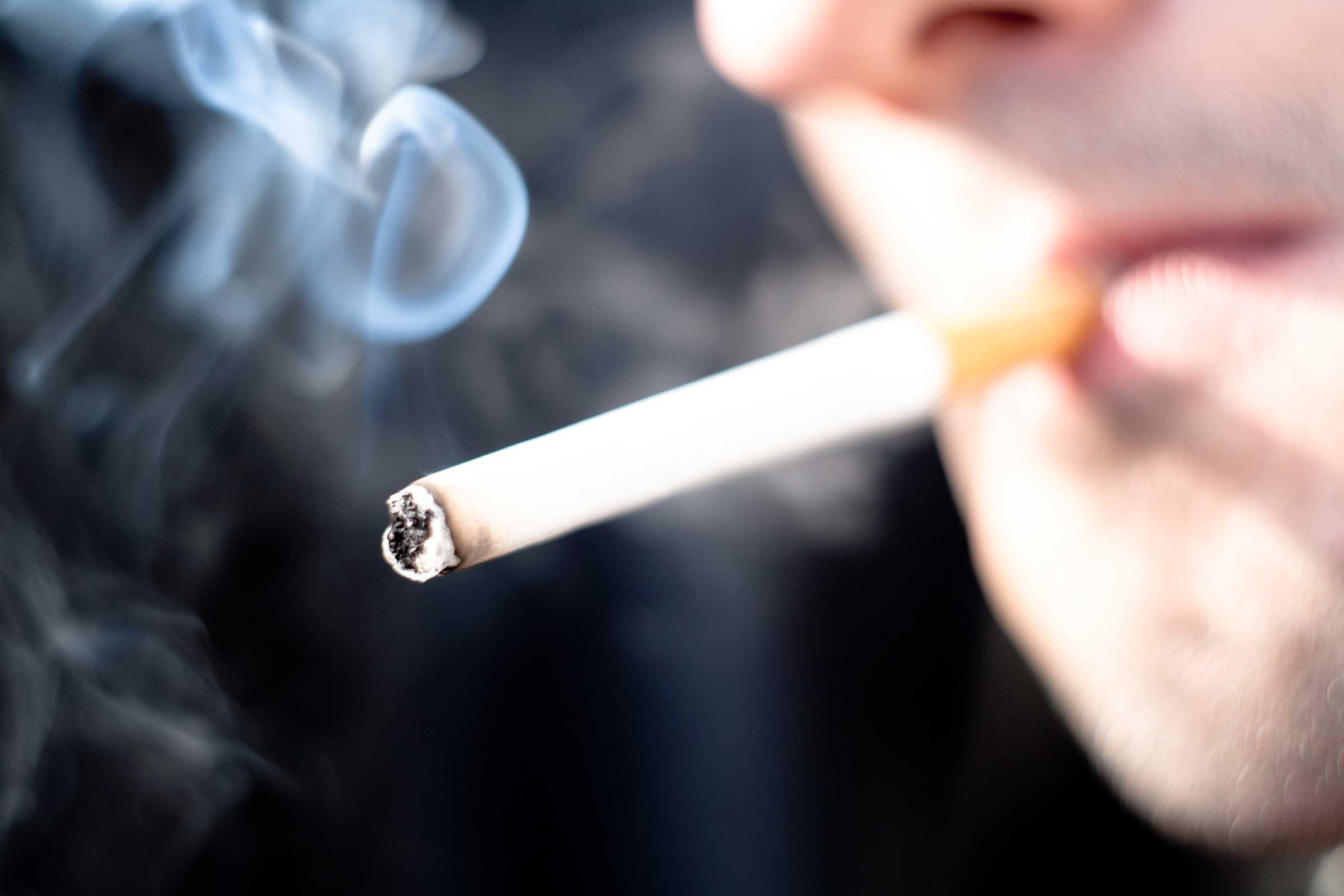
You live for cheeseburgers
It’s like a double-whammy: Research suggests eating a lot of calcium and dairy foods (like cheese) may cause a slight increase in prostate cancer risk. The same is true for red meat—and if you like it well-done, consider this. When you cook burgers at high temps to char-level, it creates chemicals that have been shown to cause changes in DNA and may increase cancer risk. Exposure to one of those chemicals—heterocyclic amines, or HCAs, that are formed in meats cooked 300°F and hotter—may lead to the development of tumors in the prostate, as well as breast, colon, and other organs, according to animal studies. Though the exact role of diet in prostate cancer is still unclear, epidemiologic studies has shown that eating well-done, fried, or barbecued meats often is associated with increased risk. On the other hand, these 30 foods have been shown to help prevent cancer.

And you always get a side of fries and sugary soda
A large of each can add roughly 900 calories to your meal—and that’s before you take a bite of the burger. Too many calories can mean weight gain, and obesity is a risk factor for many different cancers. But here’s the wacky thing about prostate cancer in particular: Some studies have found that obese men actually have a lower risk of getting a low-grade, or less dangerous, form of the disease, but a higher risk of getting more aggressive prostate cancer, one that’s harder to treat.

You don’t know your family history of prostate cancer
Think of it like a sneak peek into your future. When it comes to certain cancers—like prostate—knowing who in your family had what (and when) can hint if you have a higher-than-usual risk. Even though most cases of prostate cancer occur in men without a family history, genes may influence your chance of developing it: If your dad has it, for example, your risk doubles; your dad and brother, your chance is four times higher. Having a close relative diagnosed younger puts you at a higher risk than if the cancer was found after age 65. And here’s one you may not expect: if you have a family history of genes that increase the risk of breast cancer (BRCA1 or BRCA2) or a very strong family history of breast cancer, your risk of prostate cancer may be higher. If the disease runs in your family, it doesn’t mean you’ll get it, but you may want to discuss possible screening tests with your doctor. Here’s the truth about whether you should get a PSA test.

Your home is here
Ok, so it’s not a habit, per se. But it’s surprising nonetheless that living in North America may up your chances of prostate cancer. Other spots with high rates: Northwestern Europe, Australia, and the Caribbean islands. The why is unclear, but experts think diet and other lifestyle factors likely play a role. More opportunity for screenings may also factor in, compared to less developed areas in Central and South America, Africa, and Asia where prostate cancer is found less. These are 5 signs of prostate cancer men should never ignore.

You don’t work out
Regular physical activity comes with a long list of benefits: overall health, better mood, helps you lose weight, and—according to some evidence—may help lower your risk of prostate cancer. If you are diagnosed, recent research shows sticking to a regular regimen may improve your odds of surviving. These are other cancers you can prevent just by exercising.

You’re on your tablet until the wee hours
Exposing your body to artificial light at night has been linked to an increased risk of prostate cancer, according to several studies. That’s the same light that can also come from your smart phone when you can’t stop texting and the TV you fail to turn to off before passing out. Though more research is needed, scientists suspect the exposure to light suppresses the production of melatonin, a hormone that helps control sleep. Research from Harvard found men who sleep well at night had increased higher levels of melatonin, and were 75 percent less likely to develop advanced prostate cancer than those with less melatonin.

You (still!) smoke
This one is not confirmed, but some research has linked that nasty cigarette habit to a small increased risk of dying from prostate cancer. Though most studies haven’t shown a link between smoking and getting prostate cancer, it most definitely leads to many (many) other types, including cancers of the lung, mouth, throat, esophagus, kidney, liver, pancreas, stomach, and colon. Smoking accounts for about one-third of all cancer deaths in the US. And there’s reason enough to quit smoking for good.